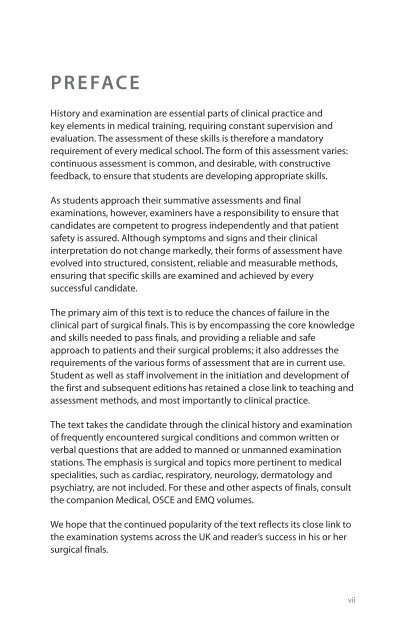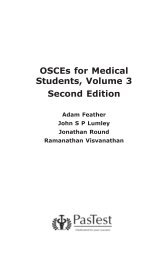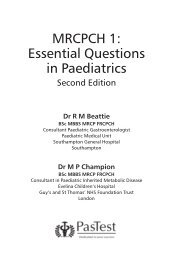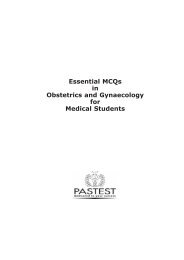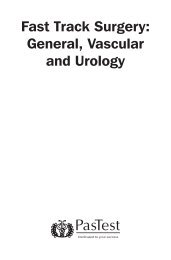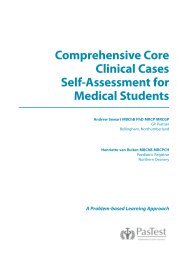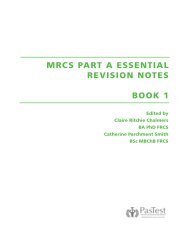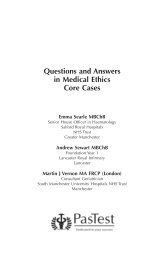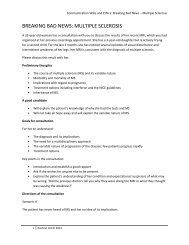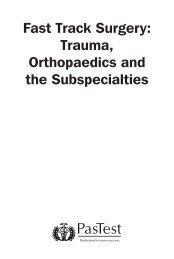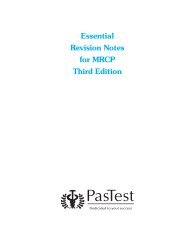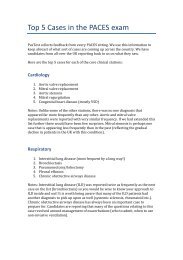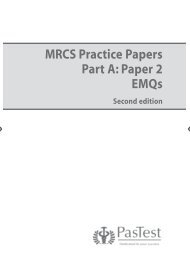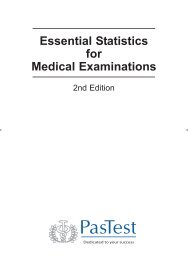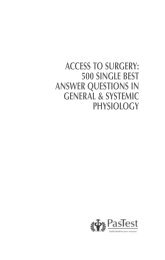SURGICAL FINALS Passing the Clinical - PasTest
SURGICAL FINALS Passing the Clinical - PasTest
SURGICAL FINALS Passing the Clinical - PasTest
- No tags were found...
Create successful ePaper yourself
Turn your PDF publications into a flip-book with our unique Google optimized e-Paper software.
PR E FACEHistory and examination are essential parts of clinical practice andkey elements in medical training, requiring constant supervision andevaluation. The assessment of <strong>the</strong>se skills is <strong>the</strong>refore a mandatoryrequirement of every medical school. The form of this assessment varies:continuous assessment is common, and desirable, with constructivefeedback, to ensure that students are developing appropriate skills.As students approach <strong>the</strong>ir summative assessments and finalexaminations, however, examiners have a responsibility to ensure thatcandidates are competent to progress independently and that patientsafety is assured. Although symptoms and signs and <strong>the</strong>ir clinicalinterpretation do not change markedly, <strong>the</strong>ir forms of assessment haveevolved into structured, consistent, reliable and measurable methods,ensuring that specific skills are examined and achieved by everysuccessful candidate.The primary aim of this text is to reduce <strong>the</strong> chances of failure in <strong>the</strong>clinical part of surgical finals. This is by encompassing <strong>the</strong> core knowledgeand skills needed to pass finals, and providing a reliable and safeapproach to patients and <strong>the</strong>ir surgical problems; it also addresses <strong>the</strong>requirements of <strong>the</strong> various forms of assessment that are in current use.Student as well as staff involvement in <strong>the</strong> initiation and development of<strong>the</strong> first and subsequent editions has retained a close link to teaching andassessment methods, and most importantly to clinical practice.The text takes <strong>the</strong> candidate through <strong>the</strong> clinical history and examinationof frequently encountered surgical conditions and common written orverbal questions that are added to manned or unmanned examinationstations. The emphasis is surgical and topics more pertinent to medicalspecialities, such as cardiac, respiratory, neurology, dermatology andpsychiatry, are not included. For <strong>the</strong>se and o<strong>the</strong>r aspects of finals, consult<strong>the</strong> companion Medical, OSCE and EMQ volumes.We hope that <strong>the</strong> continued popularity of <strong>the</strong> text reflects its close link to<strong>the</strong> examination systems across <strong>the</strong> UK and reader’s success in his or hersurgical finals.vii


